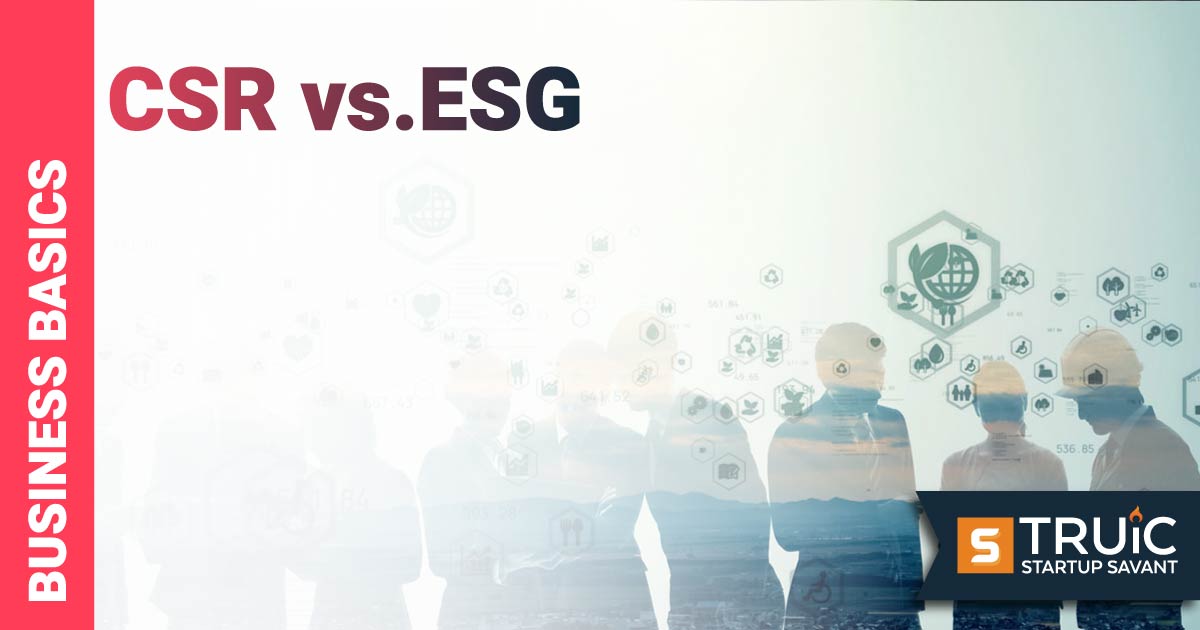CSR vs. ESG: What’s the Difference?

Last Updated: By TRUiC Team
Businesses and corporations are more prevalent today than at any point in recent history and often make significant social and environmental impacts based on their operations and methods.
Corporate social responsibility (CSR) and environmental, social, and governance (ESG) are critically important in today’s vast corporate environment, as they keep businesses accountable to the public, themselves, and their stakeholders.
What Is CSR and ESG?
CSR and ESG both focus on ways companies can operate that enhance the environment and society without any negative contributions or side effects. Corporate social responsibility (CSR) often deals with the actual operation of corporations and businesses, while environmental, social, and governance (ESG) is a framework used by investors to ensure their investments are spent in socially responsible ways.
Corporate Social Responsibility
Corporate social responsibility is a business model in which a corporation or business holds itself socially accountable and responsible to the public, its stakeholders, and itself. When a company is engaged in CSR, it operates in ways that enhance the environment and society instead of working in ways that cause negative impacts on the environment and society as a whole.
Corporations that are socially responsible have plans in place for operating in a way that supports local economies, keeps their community and employees socially active, and benefits the environment without producing excess waste or pollution.
Environmental, Social, and Governance
While some investors focus purely on profit, socially responsible investors use a framework called ESG to ensure that their investments are friendly to the environment, to society, and in the way that they’re governed.
Environmental
Evaluating a business and its environmental impact includes analyzing the waste, pollution, natural resources, and energy that the business uses in its daily operation. Investors want to be sure the company they invest in is environmentally friendly and avoids toxic emissions, properly disposes of hazardous waste, and doesn’t contribute to contaminated land.
Social
The social aspect of ESG has investors focusing on a company’s business relationships and whether it works with integrity with suppliers, its local community, and customers. This involves asking questions such as, “Does this company work with suppliers that hold similar ESG values?” “Does this company care for its employees' health and take steps to ensure employees are safe on the job?”
Governance
Investors analyzing the governance aspect of ESG in businesses hope to understand how a company performs its accounting and decision-making when it comes to critical business issues. Investors will want to know if the accounting practices of a business are transparent and ensure that stockholders are allowed to cast votes on important decisions that impact business direction.
What Is the Difference Between CSR and ESG?
CSR and ESG have several differences and are often used in different ways. When it comes to corporate social responsibility, it is the responsibility of a corporation or business to incorporate CSR values into its daily operations. This means that a business should create processes and standards for being environmentally friendly, helping their community, encouraging their employees, and working in a way that benefits society as a whole.
Environmental, social, and governance (ESG) differ from CSR in that it is a framework investors use to analyze businesses they would like to invest in. When an investor is looking to put their funds into a certain company or organization, they want to know whether that company is socially responsible and has the same values they do.
When an investor analyzes a business through the ESG lens, they make sure that the company operates in a way that helps the environment, has social responsibility in its daily operations, and is governed with integrity and transparency.
Why CSR and ESG Matter
CSR and ESG matter because they directly serve the community a business is in, hold the company accountable, offer potential tax deductions, and build trust in customers and potential customers who may be willing to spend their hard-earned money on a business in the future.
- Serves the Community: When companies focus on implementing CSR and are held accountable by ESG investors, they begin to understand that their customers and investors care about the impact they make in their communities. This often leads to these companies being more involved in their local communities and contributing more.
- Holds Your Company Accountable: Looking at business through a CSR and ESG lens allows investors and customers to hold these companies accountable. CSR and ESG both provide direct “checklists” and “guidelines” for analyzing how a business is performing when it comes to social responsibility. A company that does poorly will more likely adapt and adjust its operations.
- Potential Tax Deductions: Companies who are socially responsible may receive certain tax deductions from their respective states or the federal government. Being socially responsible is rewarded by a number of tax credits and encourages businesses to act.
- Appeal to Customers and Build Trust: Customers gain more trust in a business when they see that they care about being socially responsible and actively work towards implementing ESG-friendly operations in their day-to-day operations. While this is growing every year, the companies that customers see implementing CSR and ESG today are more likely to grow in the future, as customers will spread the word to their friends and family. When a business operates in ways that customers approve of, it can be sure to be rewarded in the future through its revenues and growth.


